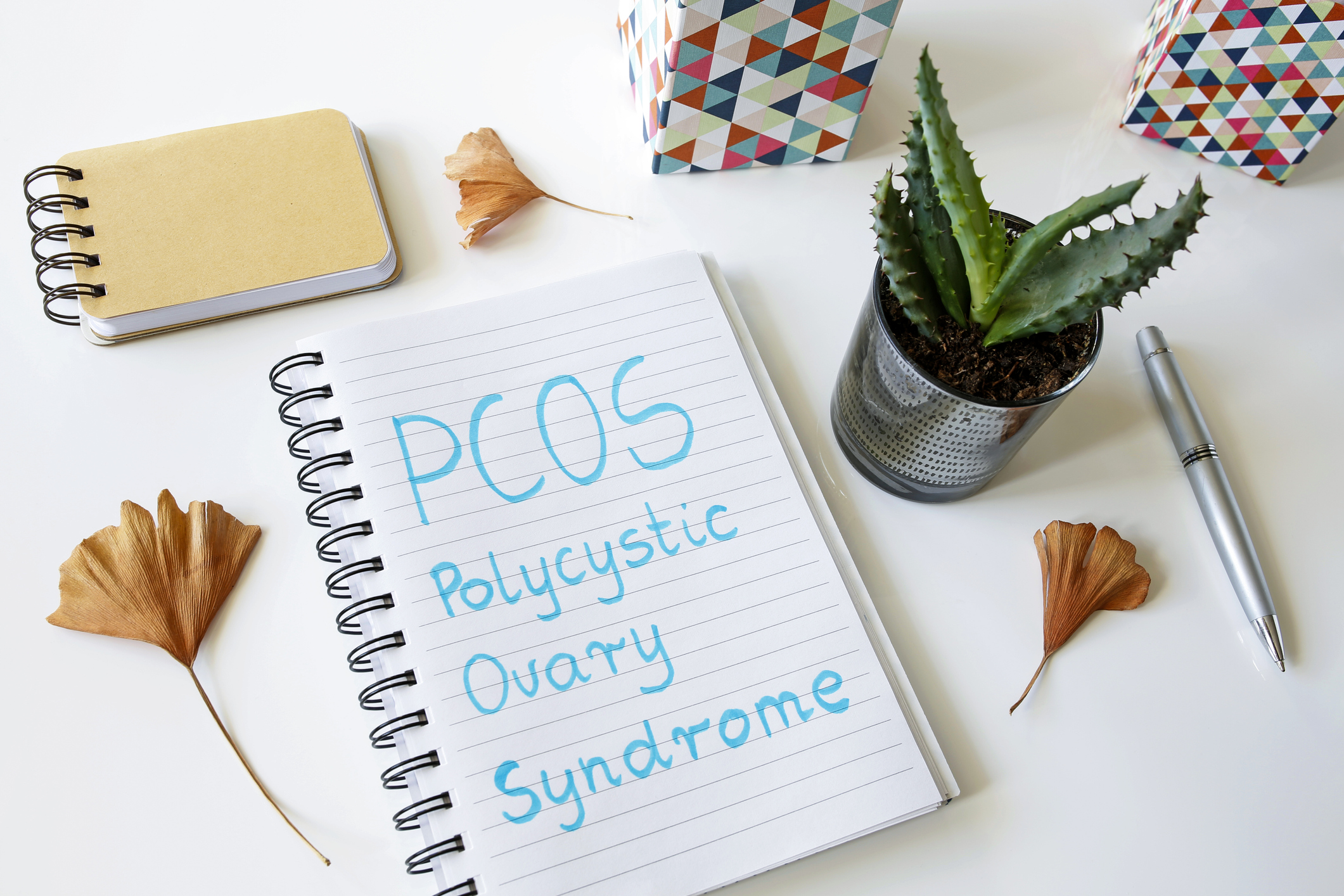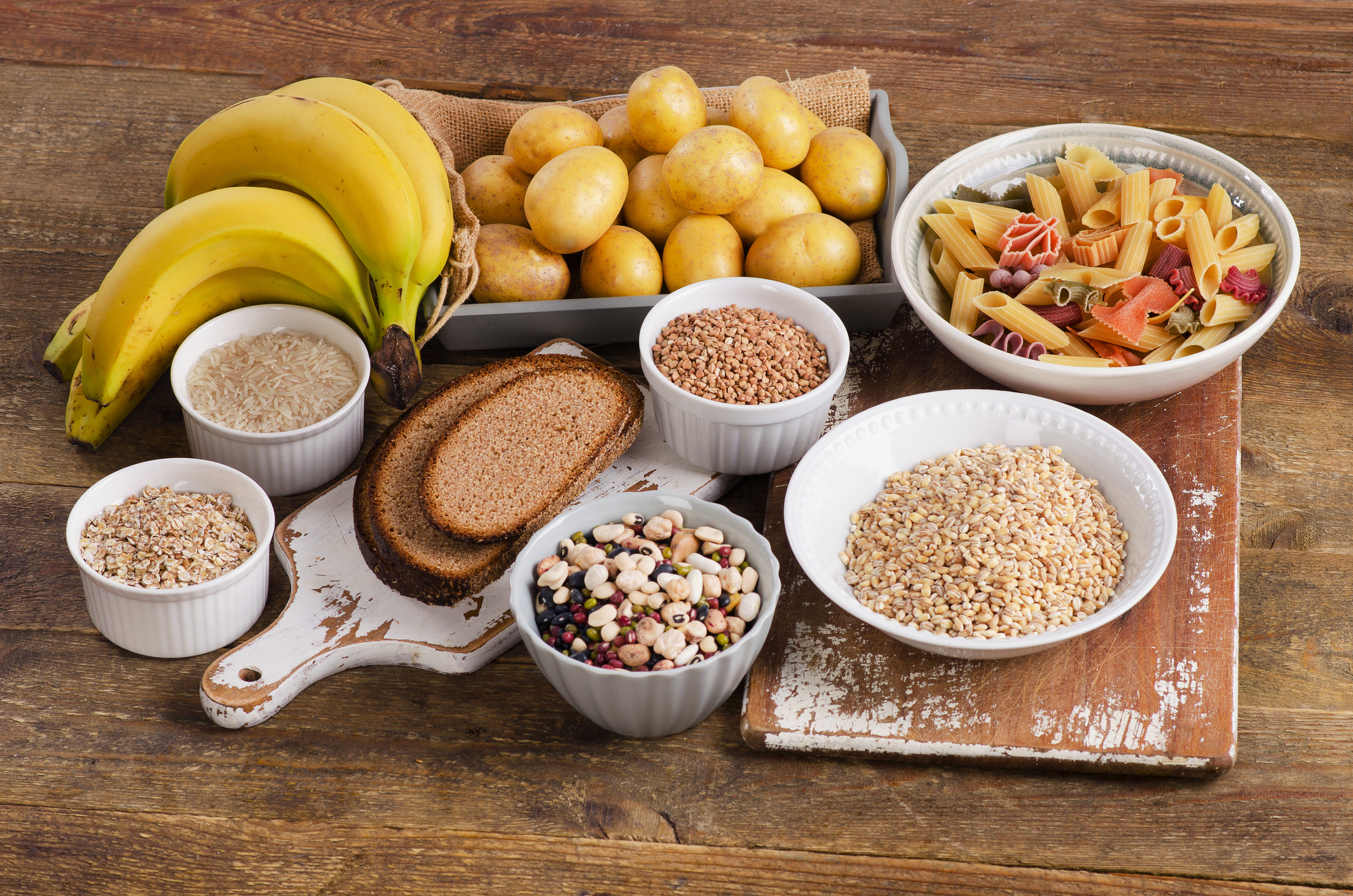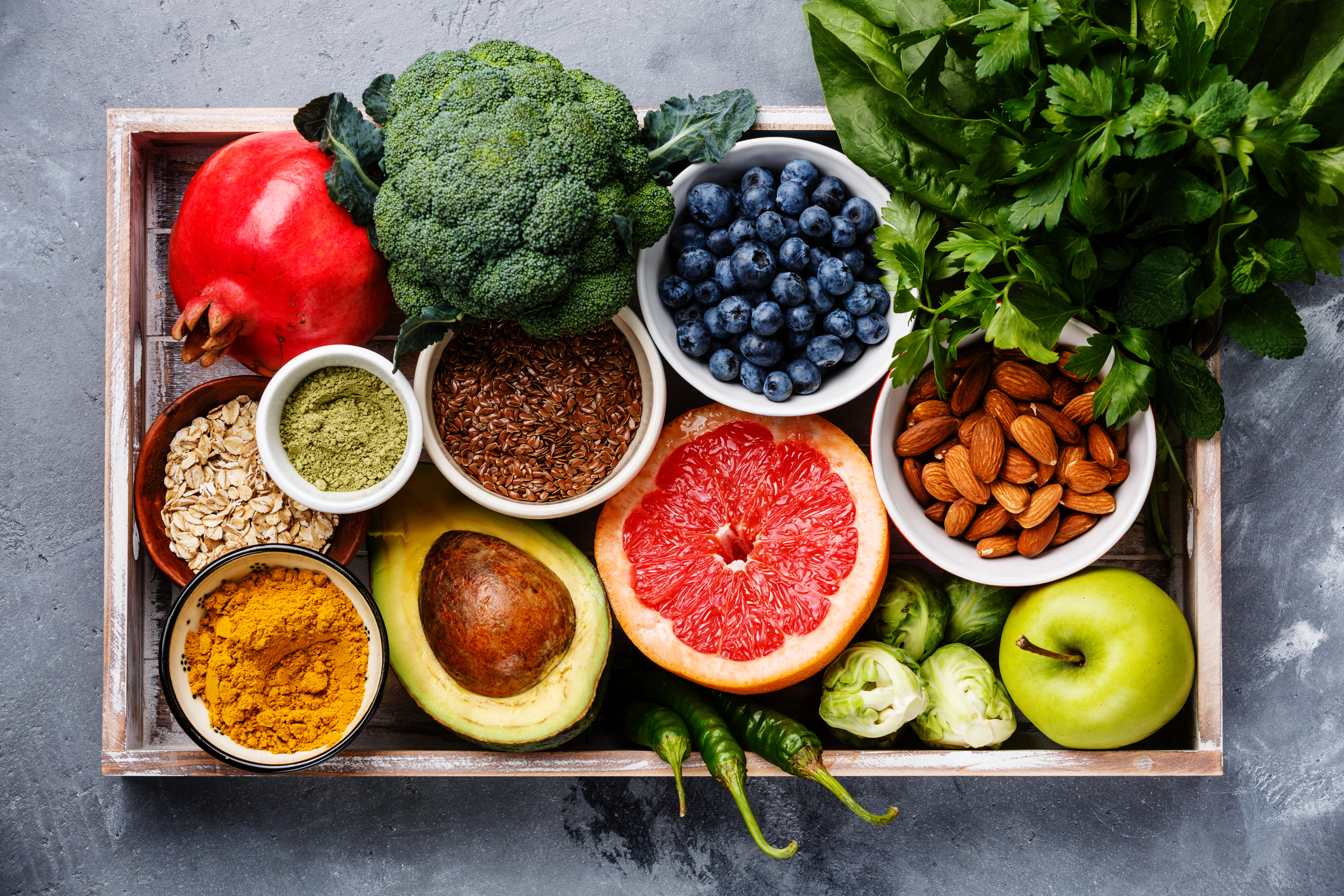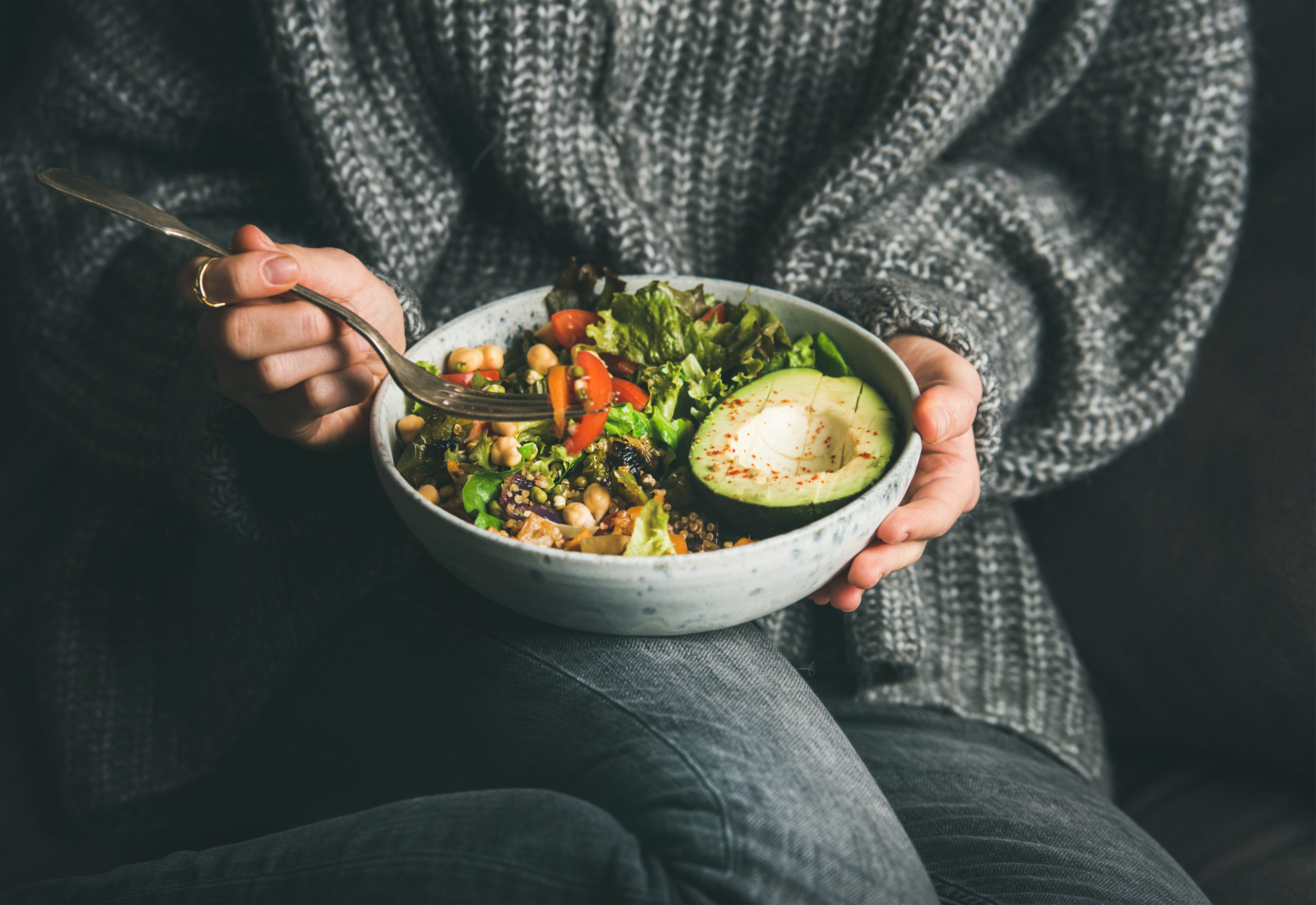What’s the best diet for PCOS?
This is a common question from the women I work with and interact with in my online community. And it’s the question I’m going to answer for you in this blog post!
The truth is, my diet recommendations for PCOS are probably very different than what you’re expecting. Just doing a quick Google search for “PCOS diet” bombards you with so many conflicting resources.
You’ll likely find information from health experts telling you that everything from a ketogenic to a high carb plant-based diet will improve your PCOS symptoms.
With the amount of conflicting information online, how are you supposed to know which diet will be best for your unique version of PCOS?
In my experience, no two cases of PCOS are the same. There are so many varying symptoms and root causes of the hormonal imbalances behind this condition.
This diversity makes recommending one diet for ALL cases of PCOS unrealistic.
PCOS is not so much a diagnosis, but an umbrella term under which fall a multitude of other conditions.
And just like no two cases of PCOS are the same, there is no one PCOS diet that will work for everyone.
Once we start treating PCOS as a broad syndrome with various underlying causes, we can work on dietary interventions that target each women’s specific version of PCOS.
Ready to learn more about how to find the best PCOS diet for you? Let’s go!

What is PCOS?
At its very highest level, Polycystic Ovarian Syndrome or “PCOS” is an endocrine disorder. The name PCOS can be confusing because there is so much more to the condition than an issue with your ovaries.
It’s thought that between 1 and 10 women actually have PCOS, but more than 50 percent of them remain undiagnosed. I’m guessing a big reason so many women don’t get diagnosed is that figuring out the correct diagnosis is so challenging!
The symptoms of PCOS can mimic many other conditions. And determining if you have PCOS based on symptoms alone is usually unsuccessful. This is why doctors rely on three main criteria in order to diagnose PCOS.
You must fall into two of these three categories to be diagnosed with clinical PCOS:
- Your periods are irregular or absent.
- You have elevated androgen levels as shown through a blood test.
- You have cysts on your ovaries.
Hormonal imbalances are the main trait of PCOS. Many women with this condition also suffer from insulin resistance and chronic inflammation. And while difficulty losing weight is a common symptom, approximately 20% of women with PCOS are either normal weight or even underweight.

PCOS Symptoms
There are many wide-ranging symptoms of PCOS. And most women with PCOS won’t experience all or even a majority of them.
The most common symptoms of PCOS are:
- Irregular or missing periods
- Abnormal hair growth (face, chest, back)
- Male-pattern hair loss
- Weight gain or difficulty losing weight
- Acne
- Infertility
- Blood sugar imbalances
If you’re experiencing any of these symptoms and think you may have PCOS, a great next step is to schedule a visit with your doctor. Testing your sex hormone levels and checking for ovarian cysts can help point you towards a definitive diagnosis and treatment options.
(Hint: those treatment options don’t have to include going on The Pill!)
Dietary interventions for the treatment of PCOS symptoms are typically very successful. Keep reading for my PCOS diet recommendations!
The Three Pillars of PCOS
PCOS is characterized by three main pillars of ill-health:
- Blood sugar imbalance
- Inflammation
- Hormonal dysregulation
These three issues can create a perfect storm in genetically-susceptible women and produce the umbrella condition of PCOS.

Blood Sugar ImbalanceS
Women with PCOS are more prone to develop impaired blood sugar regulation and Type 2 Diabetes that women without PCOS.
Blood sugar imbalances often show up as periods of elevated blood sugar after meals (hyperglycemia), and then blood sugar crashes a few hours later (hypoglycemia).
High blood sugar symptoms can include increased thirst, fatigue, dry mouth, and nausea. While low blood sugar typically makes you feel shaky, anxious, lightheaded, and irritable.
This chronically imbalanced blood sugar can often result in weight gain that can lead to obesity, which is a common trait in women with PCOS. But keep in mind, it’s not uncommon for a woman to have both blood sugar imbalances and PCOS but still have a normal BMI.
Metformin is a common drug recommended to women with PCOS because it reduces blood sugar. And while Metformin can certainly be effective at balancing blood sugar, it also comes with side effects like anemia and Vitamin B12 deficiency.
Making appropriate dietary changes can give you a similar blood sugar-regulating effect as Metformin.
If you suspect blood sugar imbalances are at the root of your PCOS diagnosis, keep reading for my diet recommendations!

Inflammation
PCOS is also strongly associated with low-grade systemic inflammation.
Some of the same pathways in the body drive both blood sugar regulation and inflammation. If one of these processes is out of balance, the other is likely to be as well. This is why both blood sugar dysregulation and inflammation often go hand-in-hand in most cases of PCOS.
Diet can be a strong contributor to inflammation levels in our bodies.
Diets high in processed carbohydrates and refined sugars have been shown to increase inflammatory markers in mice. And observations in human populations have shown a similar inflammatory response to these foods.
If you’re struggling with PCOS and eating a diet high in refined carbohydrates and sugars, keep reading for my inflammation-lowering diet recommendations!

Hormonal Dysregulation
When you think of the hormonal imbalances that accompany PCOS elevated levels of “male” sex hormones, or androgens, often comes to mind.
But many women with PCOS also experience symptoms of estrogen dominance like headaches, mood swings, breast tenderness, and long menstrual cycles.
Estrogen dominance in PCOS can be a result of the anovulatory cycles that are very common with this condition. (Anovulatory = lacking ovulation.)
“Adrenal” PCOS
And the hormonal dysregulation that is characteristic of many cases of PCOS doesn’t just stop at your sex hormones. The side effects of PCOS, mainly anovulation, can also have a negative impact on your adrenal hormones.
Conversely, your stressed adrenals can actually produce their own androgens. These are the same “male” hormones that are responsible for many of the symptoms of PCOS.
And while your ovaries are typically blamed for this androgen excess, it’s estimated that 20-30 percent of women with PCOS actually have excess adrenal androgens.
Many hormonal imbalances, even the ones behind PCOS, are a result of diet and lifestyle factors (like stress!). And thankfully, with enough practice and determination, they can easily be addressed.
If you think any of these hormonal imbalances may be behind your PCOS symptoms, my diet recommendations may be able to help reduce them!
Personal note
While I have not been formally diagnosed with PCOS, one of the reasons I’m so interested in studying PCOS – particularly adrenal PCOS – is because I struggle with PCOS-like symptoms that are brought on by stress.
My periods get long (think 40-50 days or longer), my skin breaks out, I have more annoying hair growth particularly on my chin, and at times I have struggled with stubborn excess body fat. I have been able to see a clear link between the times in my life where my stress is higher and the frustrating symptomatic changes that happen in my health.
This is a big reason why sex hormones and adrenal/HPA-Axis function has been such a big part of the work I do with women… because I know if someone like me – a clinically trained RD formally educated in health and nutrition – struggles with this stuff, there’s got to be many women out there who are struggling too.

Goals for Your personal PCOS Diet
As I mentioned earlier, there is no perfect PCOS diet.
Every woman’s PCOS presentation is going to be different. This means that every woman’s PCOS diet should be different as well.
I’m not going to give you broad-sweeping diet recommendations that focus on removing certain foods or eliminating entire classes of macronutrients.
Instead, I’m going to teach you how to eat for the three main pillars of PCOS: Blood sugar balance, inflammation reduction, and hormone regulation.
These are the three main physiological challenges behind most cases of PCOS. And when it comes to choosing the best diet for PCOS, eating to correct these top 3 imbalances is the way to go.
For some women though, dietary intervention isn’t enough to give them relief from their PCOS symptoms. In these cases, I recommend working with a trained medical professional, like myself, to come up with a diet and lifestyle protocol tailored specifically for you.

PCOS Diet Goal #1: Balance Blood Sugar
Blood sugar imbalances can be caused and exacerbated by eating a diet high in refined carbohydrates and sugars.
These foods spike your insulin soon after eating them, especially if you have underlying insulin resistance. This results in those wildly swinging highs and lows associated with blood sugar imbalance.
This is why the first goal in our PCOS diet is to eat in a way that will minimize blood sugar swings.
Now, a lot of information out there will tell you that you need to drastically cut your carbohydrate intake in order to balance your blood sugar. Lately, going “keto” is all the rage when it comes to managing blood sugar dysregulation.
But in my experience, when women attempt to go too low-carb too fast, it can result in a host of other health issues.
In fact, eating the right kinds of carbs, in the right amounts, can actually help heal your hormonal imbalances.
Eating to balance blood sugar becomes more sustainable when you reduce refined carbs and sugars and continue eating complex, fibrous carbohydrates.
Don’t Ditch Carbs
Refined carbs are absorbed quickly and spike your blood sugar, leading to a spike in insulin. But complex carbohydrates (like sweet potatoes, peas, and berries) are fiber-filled and actually help to keep your blood sugar steady. These foods as part of a balanced meal are even more blood sugar-friendly.
One study showed that eating a diet high in these low-glycemic, complex carbs helped to improve menstrual cycle regularity and blood sugar balance in women with PCOS.
Would you like to save this post?
Your email address is 100% safe and will never be sent spam.
Just because you have imbalanced blood sugar, doesn’t mean that you have to eliminate carbs altogether.
Making smarter carb choices will do wonders when it comes to helping balance your blood sugar.
And if you’re going to have sugar, remembering that it’s perfectly okay to enjoy moderate amounts of sugar. There’s no need to be paranoid about avoiding it 100% of the time. For many women, restriction around sugar leads them to binge on it when they finally “allow” themselves to have it.
Developing a healthy relationship with sugar where you can be mindful and intuitive about your sugar consumption should be the goal.

It’s Not Only About Carbs
Carbohydrates aren’t the only macronutrient to focus on when working on balancing blood sugar with PCOS.
Including a high-quality protein source and healthy fat at every meal are also key components in avoiding blood sugar swings.
Protein and fat are slow-digesting sources of long-lasting energy for your body. And when consumed with carbohydrates, they extend the amount of time it takes for your body to digest and absorb those carbs. This results in a more gradual rise in blood sugar and reduces the dramatic spikes and dips that cause symptoms.
If you’re at a loss for how to include more protein and fats in your meals, especially breakfast, you’re not alone. Making the switch from a sweet to a savory breakfast is one of the most difficult transitions when it comes to eating for PCOS. But it’s a change that can make a huge difference in your day-to-day symptoms.
Eat a High Protein Breakfast
Switching out those carb-heavy breakfasts for something with more protein and fat will give you a great starting point for balanced blood sugar and long lasting energy all day.
I co-created a 14-Day Calorie Challenge meal plan and recipe book that includes several of my favorite, macro-balanced breakfast recipes. These meal plans are great starting points to help you transition to eating meals that will keep those blood sugar swings at bay and help reduce your PCOS symptoms.
And don’t forget, I have a collection of balanced healthy recipes available for free here on my site as well!

PCOS Diet Goal #2: Reduce Inflammation
Processed foods, industrial oils, and refined sugars are notorious for inducing a chronic inflammatory response in the body.
So when we’re attempting to eat the best diet for PCOS, removing those inflammatory foods is a must!
The biggest offenders when it comes to inflammatory foods are processed grains, industrial seed oils, and trans fats. Some combination of these ingredients are found in many of the packaged foods we find in our western grocery stores.
Consuming large quantities of processed grains has been linked to an increase in inflammation markers. Industrial seed oils contain an unfavorable omega-6 to omega-3 ratio which can contribute to inflammatory diseases. And trans fats, despite being banned by the FDA in 2018, can still be found in many foods.
Whole Foods For The Win
Eating a diet that focuses on whole, unprocessed foods (think ones that comes directly from the earth) is a simple way to start eating to heal PCOS.
And if you do need to eat packaged foods for convenience, which we all do at some point, choose products that are made from real ingredients and natural sugars. Try to avoid snacks and convenience foods made from processed grains and refined sugars.
Eating more healthy fats that are high in inflammation-fighting omega-3s is also important when it comes to eating for PCOS. Fatty fish like salmon, tuna, and sardines are the best sources of omega-3 fats that you can eat.
In addition to increasing omega-3 intake, we should do our best to reduce our omega-6 intake. Swapping out inflammatory high omega-6 oils, like “vegetable” oil (corn, soy, or even cottonseed) and canola oil, for ones higher in monounsaturated fats, like avocado and olive oil, is a great way to start. You can also use saturated fats like coconut oil and animal fats as part of your fat intake, which are far healthier than industrial seed oils.
Inflammation-Fighting Foods
Fighting chronic inflammation through diet isn’t just about removing pro-inflammatory foods. Upping your intake of anti-inflammatory foods can really help move the needle on chronic inflammation as well.
Foods like berries, green tea, and even dark chocolate are packed with inflammation-fighting antioxidants. And turmeric is nature’s superfood when it comes to calming systemic inflammation.
Finding ways to incorporate more inflammation-fighting foods into your diet is a great way to help counteract this pillar of PCOS. “Eating the rainbow” is a simple way to diversify your intake of anti-inflammatory foods!

PCOS Diet Goal #3: Regulate Hormones
When it comes to balancing hormones, healthy fats are your best friends.
Hormones are actually produced using cholesterol, which is found in fattier foods like egg yolks and red meat.
So if your diet is very low in fat, and your body can’t make up the cholesterol on its own, your hormone production may suffer. Especially your female sex hormones estrogen and progesterone. These hormones are already overshadowed by androgens in many cases of PCOS.
In order to counteract the hormone imbalances found in PCOS, include a variety of healthy fats in your diet. Foods like egg yolks, salmon, avocados, and olives are all great real food sources of fats that help support healthy hormone production.
Gut Health Matters Too
Did you know that the majority of your excess sex hormones are removed from your body through your stool? That means if you’re constipated or have an underlying gut issue, you could also have a hormonal imbalance.
This is why making sure you’re getting enough fiber in your diet is another important piece in the eating for PCOS puzzle.
Fiber is the non-digestible portion of many plant foods we consume. But just because we can’t digest it doesn’t mean that we shouldn’t include it in our diet. There are two major reasons why fiber is so important to consume regularly.
First, indigestible fibers help provide bulk to your stool. This improves our ability to eliminate waste from your body. This helps remove any excess hormones that are bound to the fiber.
Second, fiber acts as food for your gut bacteria. These bacteria play a key role in keeping your digestion running smoothly, and can make a big impact on your overall hormonal health.
Including a few servings of fiber-rich foods like non-starchy vegetables, nuts, beans, sweet potatoes, apples, pears, and berries each day can help keep both your gut and your hormones balanced.

Eating More to Balance Hormones
Sometimes, dietary changes that support balanced hormones isn’t just about what you eat. It’s also about how much you eat.
Not eating enough, or chronically dieting, can seriously impact your hormone production. Hormone imbalances from malnutrition and undereating can be a contributing factor behind your PCOS-related hormonal imbalances.
I recommend using this calorie calculator to determine your individual calorie needs, and then tracking your food for a few days. This practice can help you make the necessary adjustments to your food intake that will support healthy hormone production.
If you are always undereating, you can impair your stress and sex hormones, causing you to experience adrenal PCOS symptoms. You may even develop hypothalamic amenorrhea, which is often misdiagnosed as PCOS.
For more information on how undereating can affect your hormone balance, here’s a helpful podcast episode on this topic I recorded with my friends Nicole Jardim and Nat Kringoudis.
And if you’re not sure whether you have HA or PCOS, I can help! I developed a free training dedicated to helping women regain normal menstrual cycles naturally, especially for women who have a history of undereating and/or overtraining.

Macronutrient Recommendations for PCOS
When it comes to eating for PCOS, some macronutrient modifications are necessary for many women.
A diet that overemphasizes carbs, even the plant-based fibrous kinds, can contribute to blood sugar swings and potentially exacerbate hormonal imbalances in PCOS.
Along with eating a diet that consists of eating mostly real food, I recommend that women with PCOS use the following macronutrient ratios as a guide:
20-40% of calories from carbohydrates
20-30% of calories from protein
30-50% of calories from fats
The number of calories from fat you get each day will depend on where you fall with the carb and protein percentages. The total percentage needs to add up to 100% to come up with the correct ratio for you.
For example, if you choose to eat around 30% of your calories from carbs and 25% from protein, you would need to eat 45% of your calories from fat to get to 100% for the day.
Keep Experimenting
You’ll have to play around with these macro ratios to find what works best for your body. The carbohydrate percentage seems to be the one that requires the most experimentation. Some women will do better on a lower carb diet, others will thrive on a higher carb diet, especially if they’re more active. Your mileage will vary.
No matter where you fall within these guidelines, remember this: a healthy PCOS diet is NOT a zero carb diet!
PCOS or not, cutting carbs too low can result in some severe hormonal imbalances that go beyond PCOS.
No healthy, sustainable diet should completely eliminate an entire food group unless you have a severe allergy, intolerance, or autoimmune disease. And the best diet is the one that allows for the greatest amount of dietary diversity, from both plant and animal foods. Don’t get stuck on a super-restrictive diet thinking that’s the only way to manage your PCOS!

Let’s Make Things Simple!
I know that diet changes can be difficult, especially when they’re necessary because of a new diagnosis like PCOS. To help you ease the transition, here’s a short list of some foods to emphasize or minimize in a healthy PCOS diet.
And if altering your diet to heal your PCOS still seems overwhelming, I can help! Click here to sign up for a strategy session with me, and we can work together to get you on a diet plan that will be best for YOUR unique PCOS case.
Foods to Enjoy with PCOS
The foods on this list are ones that will support the three pillars of PCOS and reduce unwanted symptoms. Most women can eat these foods to appetite with no issues and experience healthy hormones.
Some women may need to be cautious with their carb intake. But most women can do fine with eating real food carbs and not worrying about the exact portion sizes. And some women actually need more carbs to heal their hormones. (This is where working with a trained healthcare provider can really help!)
- Cruciferous vegetables
- Leafy greens and other non-starchy vegetables
- Fatty fish (e.g. tuna, salmon, trout, sardines)
- Whole eggs (psst… they won’t kill you)
- Grass-fed protein sources (e.g. beef, lamb, bison, chicken, turkey)
- Organ meats (like liver!)
- Colorful Berries
- Whole fruit (e.g. apples, pears, pineapple, grapes)
- Healthy fats (e.g. olive oil, tallow, lard, ghee/butter, avocado oil, coconut oil)
- Nuts and seeds (e.g. almonds, walnuts, pecans, sunflower seeds, pumpkin seeds)
- Avocado
- Coconut products
- Plant-based starches (e.g. sweet potatoes, white potatoes, beans, plantains, squash)
- Green or black tea (here’s my favorite brand)
Foods to Limit with PCOS
In a healthy PCOS diet, I recommend limiting or avoiding these foods altogether. These foods are the main dietary contributors to the three pillars of PCOS and can often exacerbate your symptoms. This isn’t to say that you can never enjoy a scoop of real ice cream or eat at the Whole Foods hot bar. But try not to make these foods a staple in your diet.
- Dairy
- Industrially-produced soy products
- Refined sugars
- Industrial seed oils (canola, soybean, vegetable oils)
- Processed foods
- Sugary beverages
- Fried foods
- Pastries, cookies, cakes
- Anything with trans fats
The Bottom Line on the Best Diet for PCOS
There is no perfect, one-size-fits-all diet for PCOS.
This is why my PCOS diet recommendations center around eating for the three pillars of PCOS – blood sugar balance, inflammation reduction, and hormone regulation.
I recommend focusing on eating a real-food diet high healthy fats, fiber, and high-quality protein sources while moderating your carb intake to match your activity levels.
These dietary changes will give you the best fighting chance at reversing your PCOS diagnosis and healing your body. Just by using food as medicine!
Diet can be a powerful tool in the treatment and management of PCOS. But sometimes diet alone is not enough to overcome the hormonal imbalances behind this condition.
If that’s the case for you, I’d love to help you get to the root of your PCOS diagnosis. Click here to sign up for a strategy session so we can reverse your PCOS and heal your hormones for good!
Now it’s your turn… let me know what you thought of my dietary recommendations from PCOS? Are they different or similar to what you’ve heard before? Are you planning on implementing any of these recommendations for your own PCOS?
Let me know in the comments below!
This post may contain affiliate links. If you click on a link and make a purchase, I may receive a small commission.


+ show Comments
- Hide Comments
add a comment